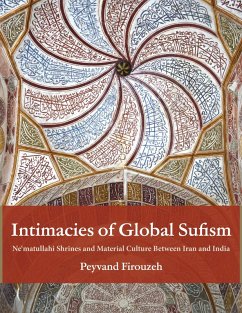From the fifteenth century onwards, followers of the Sufi poet Shah Nematullah Vali navigated land and sea routes through Central Asia, Iran, and India. Along the way, they built shrines whose poetry, spatial configuration, and materiality created intimate religious spaces that engaged local audiences, invoked distant places, and brought together pilgrims, itinerant artists, merchants, and courtiers from many regions. Countering global art history approaches that have privileged east-west connections, Intimacies of Global Sufism centers relationships between the local and global across Iran, the Deccan, and Mughal India. Within this framework, the book sheds light on both the opportunities and challenges that Sufis encountered in developing a transregional network of material culture. Using the concept of intimacy to highlight the shrines' affective interconnections between people, objects, and ideas, author Peyvand Firouzeh invites readers to step inside these significant but understudied sacred spaces and rethink their wider religious and material significance. Looking closely at sites ranging across thousands of kilometers, this book combines a detailed analysis of architecture, objects of ritual, and manuscripts, with local and dynastic histories, Sufi poems, patronage documents, and a unique focus on the disciple-artists who created these spaces. The movement between small spaces and global perspectives allows us to make sense of two seemingly contradictory sides of Sufi material culture: its tendency toward asceticism, and its investment in monuments and transregional connections. Richly illustrated with more than 140 images of these sites, their architecture, and their artifacts, Intimacies of Global Sufism offers readers a new vantage point on the early modern world and the making of transregional community through sacred spaces. Intimacies of Global Sufism is the recipient of College Art Association's Millard Meiss Publication Fund, The Barakat Trust Publication Award, The New Foundation for Art History Publication Subvention Grant, and the Persian Heritage Foundation Publication Grant.
Bitte wählen Sie Ihr Anliegen aus.
Rechnungen
Retourenschein anfordern
Bestellstatus
Storno








